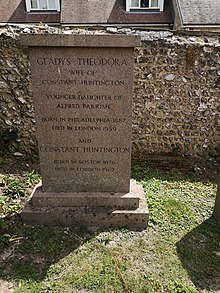Gladys Huntington
Gladys Huntington (1887 – 1959), née Parrish, was an American writer. Huntington's works include the novel Carfrae's Comedy, the play Barton's Folly, and the bestselling book Madame Solario.

Gladys Theodora Huntington | |
|---|---|
| Born | Philadelphia, Pennsylvania |
| Occupation | Writer |
| Language | English |
| Nationality | American |
| Spouse | Constant Huntington |
Biography
Huntington was born Gladys Theodora Parrish in Philadelphia to a Quaker family on December 13, 1887.[1] Her parents were Alfred Parrish and Katharine Broadwood Jennings. From a young age, she lived in New York, Paris, London, Biarritz, Rome, and "a villa on Lake Como."[1]
She married Boston native Constant Huntington on October 17, 1916. [2] The two moved to London where Constant opened Putnam's London office.[3] The two resided in Hyde Park Gardens and then at Amberley House in Sussex, where they remained until her death.[1]
In 1959, three years after the publication of Madame Solario, Huntington committed suicide. [4]
Writing
Huntington published two novels, a play, and two short stories in The New Yorker. She is best known for Madame Solario. The novel was anonymously published in 1956 (likely due to what was considered scandalous content), and her identity as the author would not be revealed for three decades. The story takes place in Cadenabbia on Lake Como in 1906.
The novel has been translated into seven languages.[1] However, it went out of print for a period of time. Persephone Books released a new edition in 2016 with a foreword by Alison Adburgham. It was adapted into a French film by René Féret in 2012.[5]
In a segment on neglected books, Mary Renault in The American Scholar praised the book and called it "one of the finest novels of our century."[6] In a letter, Paul Bowles called it "beautifully imagined and written", adding, "What a shame that the author never wrote anything else! And didn’t even dare sign her name to it for fear of scandalizing her British in-laws. (She was American, of course!)"[7]
When Penguin published the novel in paperback in 1978, The New York Times wrote, "When first published 1956, this anonymous novel was acclaimed for its elegant style and disturbing urgency. It deserves a new audience."[8]
Huntington's prose is often compared to that of Henry James. After her death, she left an unfinished novel, titled The Ladies' Mile.
Works
- Carfrae's Comedy (1915)
- Madame Solario (1956)
References
- "Constant Huntington, 86, Dead; Led Putnam Books of London". Nytimes.com. 7 December 1962. Retrieved 21 March 2019.
- "Gladys Huntington". Librarything.com. Retrieved 21 March 2019.
- "Madame Solario". Siff.net. Retrieved 21 March 2019.
- "Neglected Books Revisited, Part 2". The American Scholar. 20 July 2015. Retrieved 21 March 2019.
- Christie, Tom. ""No Films Are Ever Made": A Correspondence with Paul Bowles". Los Angeles Review of Books. Retrieved 21 March 2019.
- "Paperbacks:". The New York Times. 6 August 1978. Retrieved 21 March 2019.